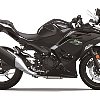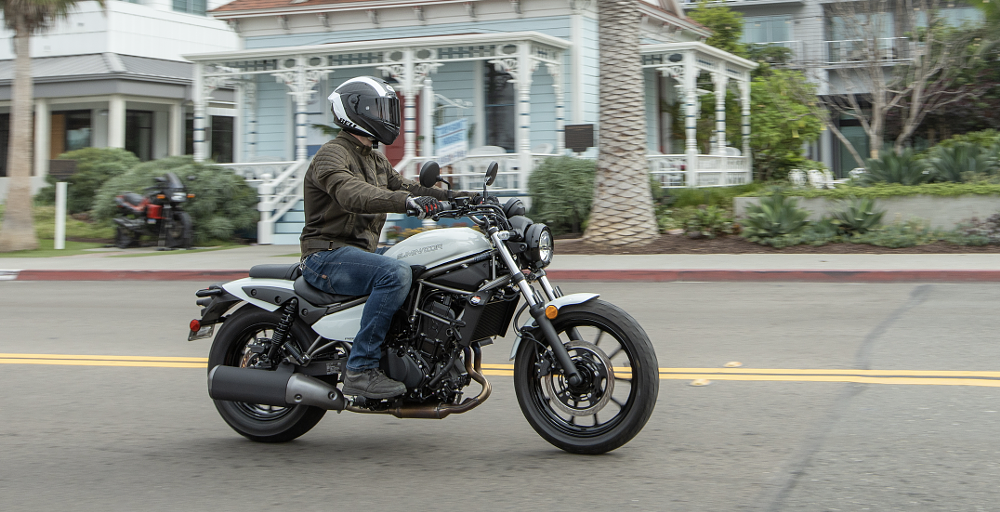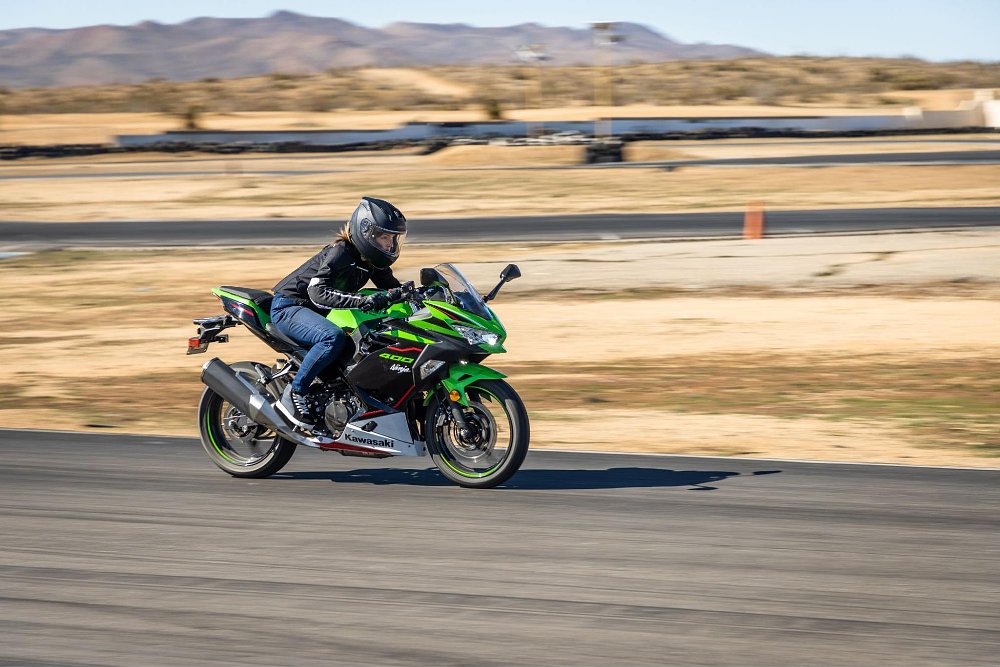With displacement creep, a new look, some new features, no less than five color schemes and seven variations to choose from, and not even a price boost for the base model, a popular name from the past is back in Kawasaki's lineup. The 2024 Kawasaki Ninja 500, previously announced in other world markets, is now available in the United States.
For what seemed like a few geological epochs, the original Kawasaki Ninja 250 was the entry point into motorcycling for riders who wanted a sport bike but were short of leg, short of cash, or just plain smart enough not to start learning to ride on a high-strung 600 cc race replica. Then Kawasaki finally modernized the 250, bumped it up to the 300, and then the Ninja 400, which has been successful both in the showroom and on the track. You might think the MotoAmerica Junior Cup is a spec bike series. It used to see three or four brands on the grid, but last year, everyone in the class was racing a Ninja 400.
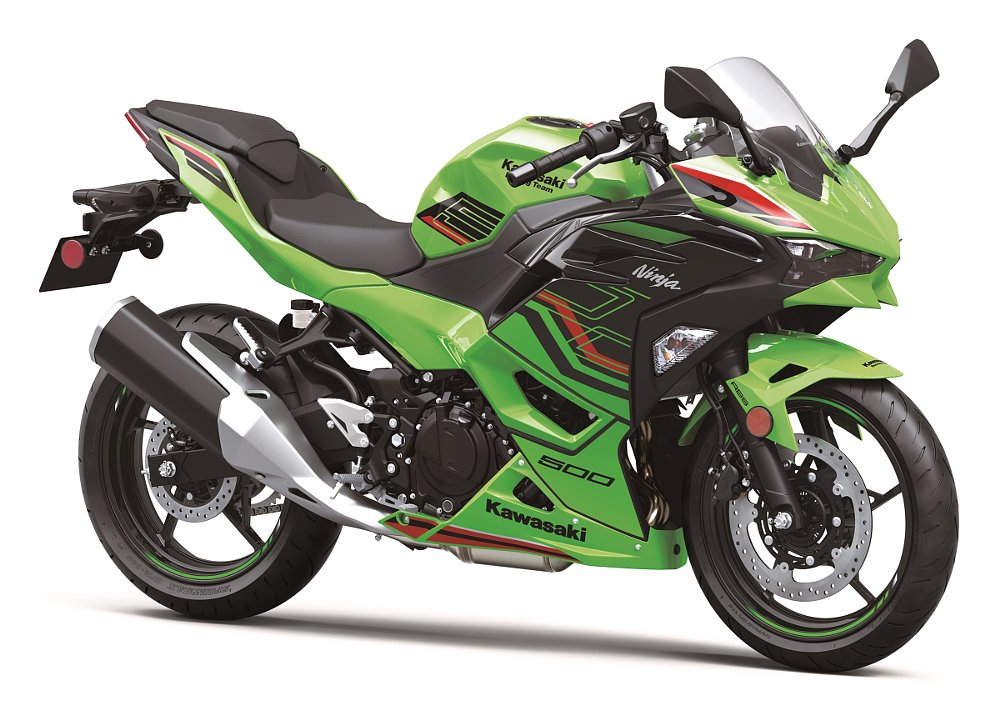
Considering the Ninja 650 is not that far away from the 400, we might have thought displacement creep was finished, but not so. For 2024, Kawasaki increased the Ninja 400's displacement by 52 cc by lengthening stroke by 6.8 millimeters to 58.6 while keeping the bore at 70.0. That yields 451 cc, as previously seen in the new Kawasaki Eliminator cruiser, and if you round off to the nearest hundred — magic! — the Ninja 500 is back.

Kawasaki is not specifying a horsepower output for the revised engine, but the peak torque of 31.7 foot-pounds listed for the Ninja 500 is exactly the same as the specification for the Eliminator, so it appears the engine is in the same tune. And other documentation for the Eliminator showed peak horsepower of 52 at 10,000 rpm, so expect the same for the Ninja 500. After riding the Eliminator, Ari said the sporty nature of the engine left him thinking of a Ninja 450, and now that's what we have. As an added bonus, the Ninja 500 costs more than $1,000 less than the Eliminator. Even the top Ninja 500 SE 40th Anniversary Edition with ABS, special paint, and lots of other extras is priced a bit lower than a base Eliminator. Sometimes I don't understand motorcycle pricing.
Kawasaki has beefed up the slipper and assist clutch and redesigned the balancer shaft to match the larger displacement on the Ninja 500.
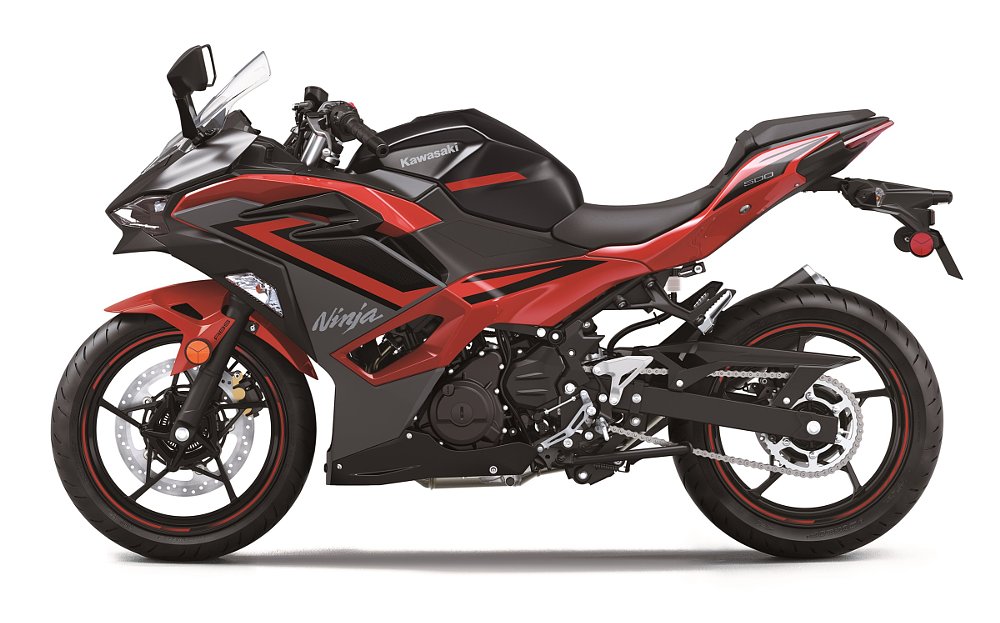
Arguably, the Ninja 500 differs more from the 400 in appearance than mechanicals. For consumers who may have size envy, Kawasaki says the new fairing gives the 500 "a commanding 'big bike' look and feel." It also borrows styling touches from the larger Ninjas, such as the revised LED headlights with spoilers positioned underneath them. And praise be, Kawasaki didn't decide that the new fairing should only be shrouded in matte black and gray tones. Of course a dull black is available, for those enjoying the recent color trends, but there's also a silver version that's arguably not gray, a red-and-black version, the KRT Edition painted to pay homage to Kawasaki's racing colors, and a 40th Anniversary Edition for those who want to rock the throwback colors of Kawis of the 1980s.
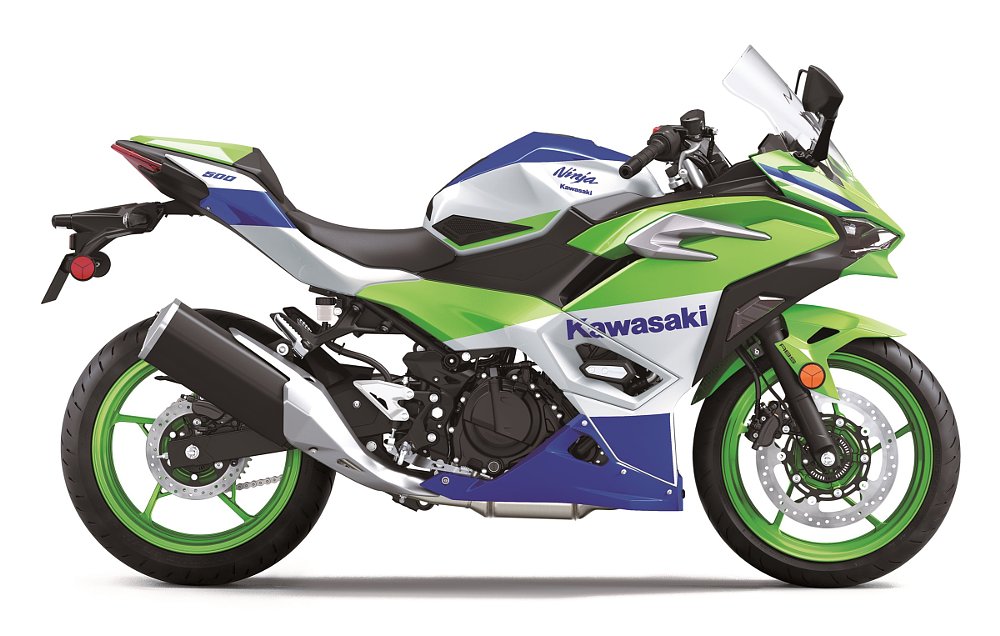
Kawasaki Ninja 500 SE
If you're choosing among the base Ninja 500, your decisions are mainly limited to color and with or without ABS. But Kawasaki is also offering an SE version that adds quite a few features.
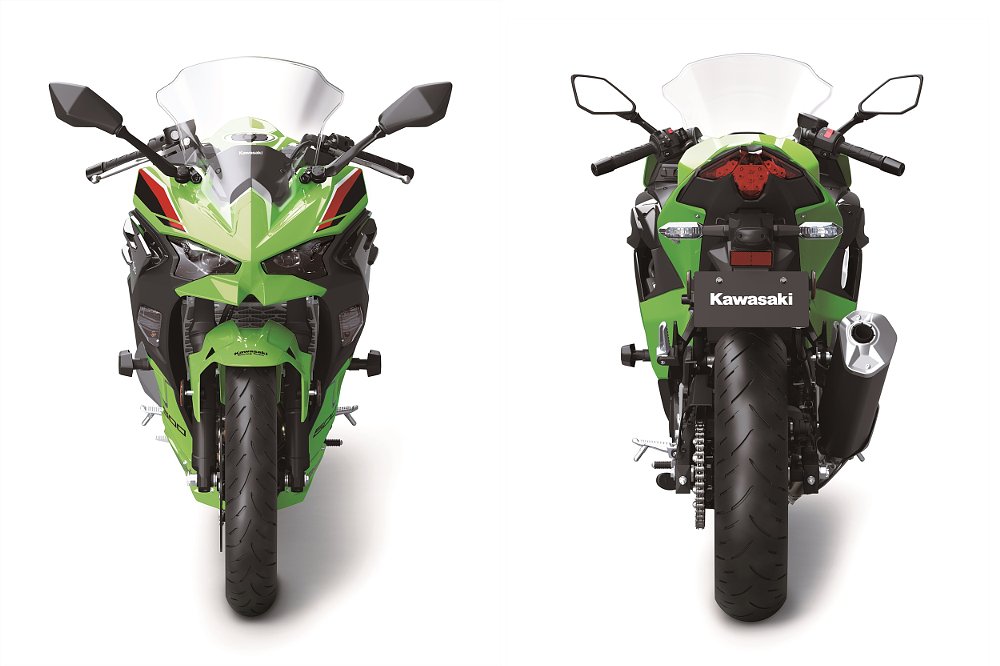
While the regular Ninja 500 gets a new LCD display, the SE gets a full-color TFT display and a USB-C outlet beside it. All versions offer smartphone connectivity via Kawasaki's Rideology app. The SE gets KIPASS, Kawasaki's keyless remote ignition and steering lock control. Other extras on the SE include a larger windscreen, frame sliders, a radiator screen, a rear seat cover, and other items that can be added to a base Ninja 500 as accessories. The SE version comes in the same choice of colors as the base Ninja 500, except for the silver. The 40th Anniversary Edition is only available as an SE with ABS.

The Ninja 400 was already a sweet-handling motorcycle that was capable of just about any road riding you'd want to do, except maybe two-up riding of any distance. The changes should make the Ninja 500 even a bit more capable and build on that model name's legacy.
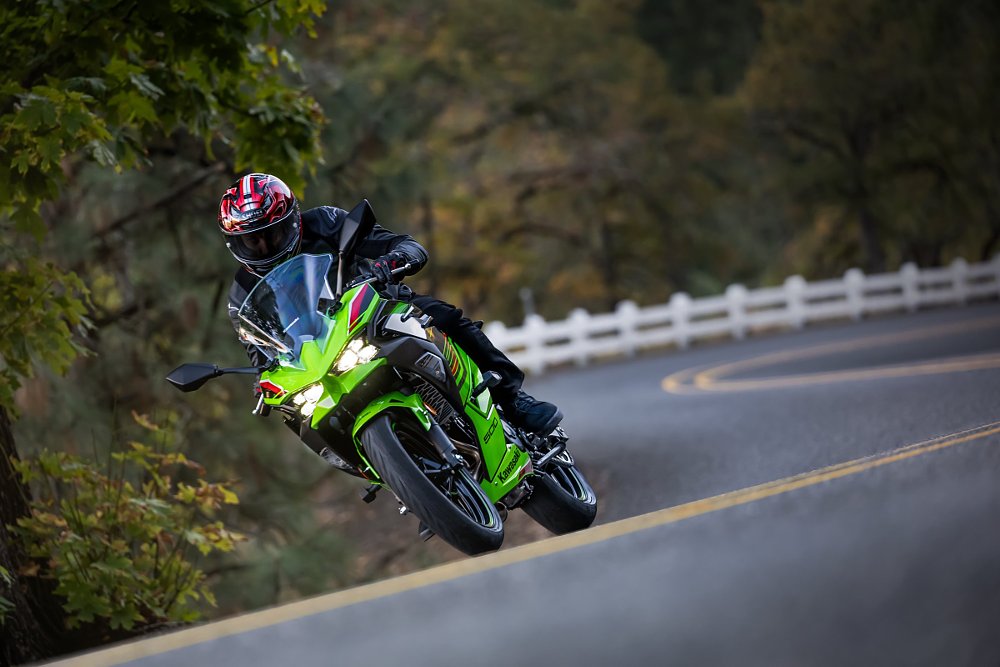
The original Ninja 500, which had a long run from the late 1980s to the late 2000s, was revered in certain pragmatic circles of the motorcycle world as a tough little bike that was more capable than many assumed. A friend of mine used to have one and was known for saying "a Ninja 500 is all the motorcycle anyone needs." Of course he weakened his argument by going on to buy several other motorcycles. More recently, one Zillan fished a Ninja 500 out of a dealership's junk pile and entered it in the Reliability Rally. Another Zillan built what we called the ultimate do-it-all bike for $1,000 and proceeded to use it for everything from an off-road enduro to taking his dog for joy rides.
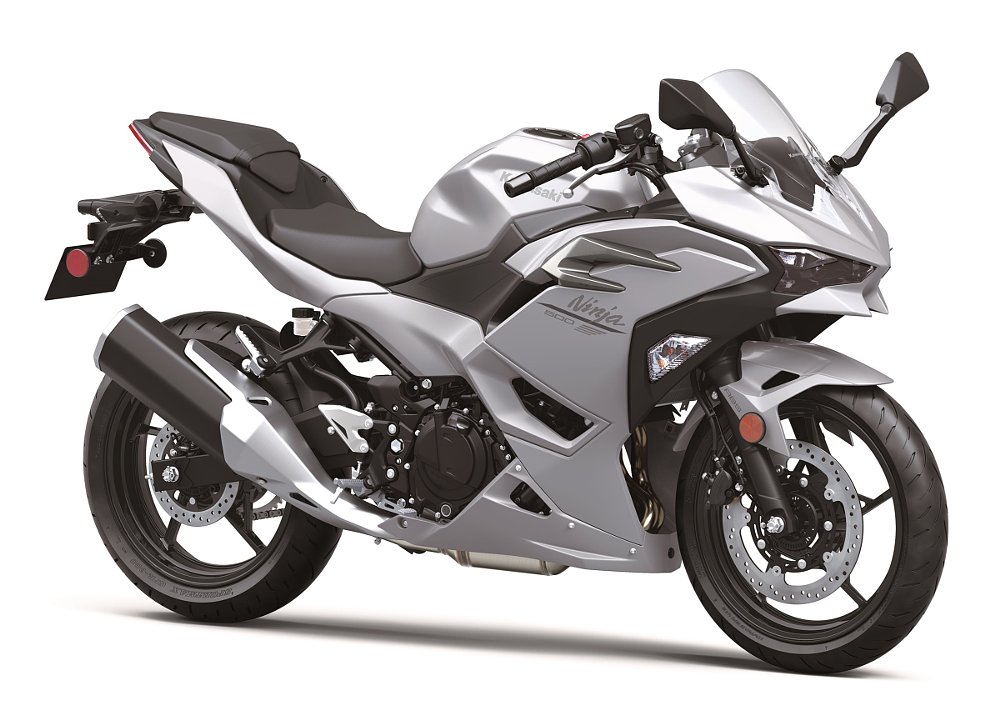
With its full fairing, modern instrument display, smartphone connectivity, ABS, and other features, the 2024 Ninja 500 is far fancier than the workhorse of old. Plus, despite having nearly doubled in displacement from its Ninja 250 origins, it now must also fill the role of being the smallest sport bike in Kawasaki's lineup. That gives it two big sets of shoes to fill, but if it's an improvement, as Kawasaki says, it should add to the Ninja 500 reputation.
| 2024 Kawasaki Ninja 500 | |
|---|---|
| Price (MSRP) |
Base: $5,299, $5,699 with ABS KRT Edition: $5,499, $5,899 with ABS SE and KRT Edition SE with ABS: $6,399 SE 40th Anniversary Edition with ABS: $6599 |
| Engine | 451 cc, liquid-cooled, eight-valve, parallel twin |
|
Transmission, final drive |
Six-speed, chain |
| Claimed horsepower | NA |
| Claimed torque | 31.7 foot-pounds @ 7,500 rpm |
| Frame | Steel trellis |
| Front suspension | 41 mm fork; 4.7 inches of travel |
| Rear suspension | Single shock, adjustable for preload; 5.1 inches of travel |
| Front brake | Nissin single two-piston caliper, 310 mm disc, with optional ABS |
| Rear brake | Nissin two-piston caliper, 220 mm disc, with optional ABS |
| Rake, trail | 24.5 degrees, 3.6 inches |
| Wheelbase | 54.1 inches |
| Seat height | 30.9 inches |
| Fuel capacity | 3.7 gallons |
| Tires | Dunlop Sportmax GPR300, 110/70R17 front, 150/60R17 rear |
| Claimed weight | 370.4 to 379.3 pounds |
| Available | Now |
| Warranty | 12 months |
| More info | kawasaki.com |






